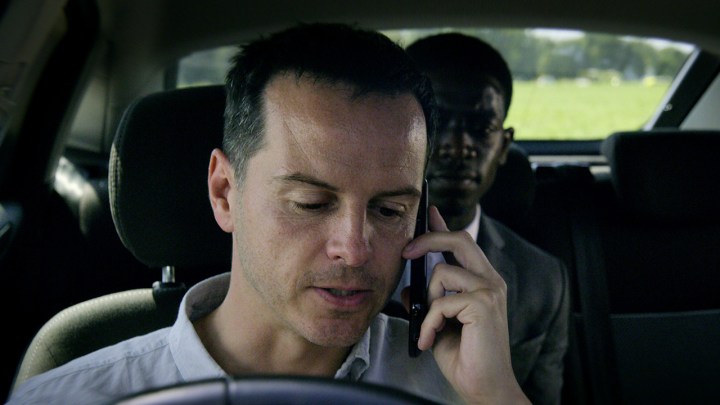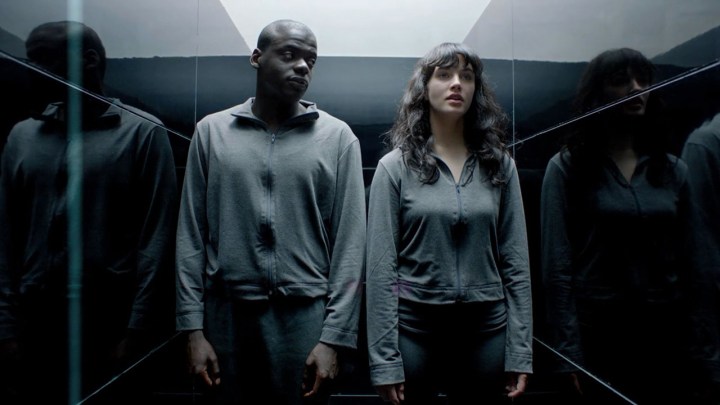With the anticipated sixth season of the British anthology series Black Mirror about to debut, fans can’t wait to sink their teeth into a new set of disturbingly thought-provoking episodes. With just five episodes set to debut on June 15 that feature a mix of actors like Annie Murphy (Schitt’s Creek, Russian Doll), Aaron Paul (Breaking Bad, Westworld), Kata Mara (House of Cards, Class of ’09), and Zazie Beetz (Atlanta, Easy), it’s poised to be an exciting season.
Looking back at the previous five seasons, there are episodes that stand out as being some of the best and most talked-about ones, like White Christmas, Black Museum, San Junipero, The Entire History of You, USS Callister, and, of course, the interactive special Black Mirror: Bandersnatch. If you’re looking to relive older episodes before diving into these new ones (or even after), there are a couple of underrated ones that are worth a second watch, too.
Men Against Fire (season 3, episode 5)

A politically relevant episode, Men Against Fire follows a soldier named Stripe (Malachi Kirby) who is tasked with killing mutants known as roaches that he can spot using a neural implant. But when the implant malfunctions, he discovers that these “roaches” aren’t monsters at all, but rather terrified humans, including women and children, trying desperately to survive under siege. He grapples with this reality, or rather altered version of reality, that is forced on him. It’s meant to allow him to do his job without remorse, regret, or hesitation. But now that Stripe knows, can be continue?
The episode touches on genocide and “genetic cleansing,” and the terrifying ways that technology can help militaries with nefarious intentions. They can commission heinous acts while using unsuspecting and otherwise unwilling individuals to achieve them. Even when they learn the truth, the soldiers’ memories are wiped at the end of each raid so they can do it all over again. Stripe is left with an impossible choice that sparks discussion and debate about morality, loyalty, and coercion.
Smithereens (season 5, episode 2)

One of the most understated episodes of Black Mirror, Smithereens has a premise that’s relatable to just about anyone. Frustrated with people living with their heads stuck in their phones all day, a rideshare driver named Chris (Andrew Scott) decides to take a young man hostage. Jaden (Damson Idris) works for a dominant social media company called Smithereen and Chris believes he can reach the company’s billionaire owner, the eccentric Billy Bauer (Topher Grace), to make his demand: End his app once and for all, or else.
With parallels drawn between Smithereen and Twitter, as well as Jack Dorsey (Twitter’s CEO at the time) and Bauer, the underlying message behind the episode is about the power social media wields over people, and its damaging and dangerous addictive qualities. The episode was criticized for having too simple a message, though Scott received an Emmy nomination for his powerful performance. Nonetheless, sometimes simplicity is all that’s needed to get the message across, and this episode about social media, personal accountability, and guilt is one that will hit close to home for many people.
Fifteen Million Merits (season 1, episode 2)

Coming off the heels of the disturbing first episode of Black Mirror, the second episode of the series continues the show’s mantra of worst-case scenario future situations related to our reliance on tech. Daniel Kaluuya (Get Out, Black Panther) stars as Bing alongside Abi (Jessica Brown Findlay, Downtown Abbey, Harlots) as two people who live in a society based on currency called “merits.” They must continuously cycle on a stationary bike to earn these merits, which can then be cashed in for various goods. Abi is determined to be famous, and Bing encourages her to participate in a talent show to pursue her dream. But the outcome is not what either of them hoped for.
A social commentary on capitalism with a Twilight Zone feel to it, Fifteen Million Merits takes a dark and twisted turn. People earn merits to not be subjected to looking at screens 24/7. Even when something undesirable appears, they are forced to stare — a high-pitched screeching noise sounds if they try to look away. We love our screens so much, but what if we were stripped of every luxury beyond them? This episode is an eye-opening warning about our reliance on technology, fake personas, and attention-seeking.
Hated in the Nation (season 3, episode 6)

Criticized by many for being too long with a runtime of an hour and 29 minutes, Hated in the Nation has a big story to tell about social media, and it takes a while to get there. But if you go into the episode with the right mentality, knowing it is the length of a movie, it’s one Black Mirror episode worth watching again. A far-right journalist is found dead after writing a controversial column, and detectives are trying to get to the bottom of it. They soon realize a link between the death and that of others: they were all subjects of a “#DeathTo” hashtag online.
The episode shifts into Saw territory with a seemingly twisted killer playing their own political “Game of Consequences,” as the person who receives the biggest number of mentions under this hashtag each day is killed. A complicated story that involves facial recognition technology, government surveillance, and death by suicide, the episode is a terrifying look at the toxicity of social media and the detrimental effects of cancel culture.
Be Right Back (season 2, episode 1)

It’s a wonder that Be Right Back doesn’t get the attention it deserves as a fabulous episode about dealing with death and grief. When Martha’s (Hayley Atwell) boyfriend, Ash (Domhnall Gleeson), tragically dies in a car accident, she is tempted by a technology that allows her to continue to communicate with an AI version of him. By amassing everything Ash has posted online through his life, and everything posted about him, the AI can replicate his voice, personality, even memories — to the point where Martha truly feels like she’s talking to him.
Is it better to grieve in a healthy way and let someone go? Martha becomes obsessed with the technology that’s keeping Ash “alive,” and becomes further tempted when an upgraded version provides the opportunity to live with a synthetic android likeness of her dearly departed beau. She quickly realizes, however, that even if this robot looks, talks like, and even acts like Ash, it isn’t truly him. What’s so terrifying about this episode is that with the existence of AI chatbots, the amount of personal information we share online, and the latest developments in robotics, such a technology doesn’t seem that far off from reality. This episode of Black Mirror shows a haunting worst-case scenario of playing with life, death, and the emotional need to let go and move forward.

